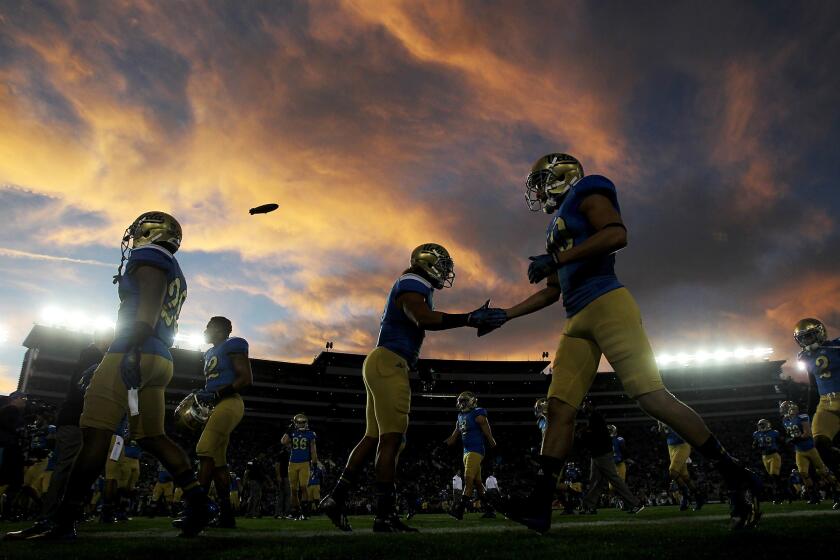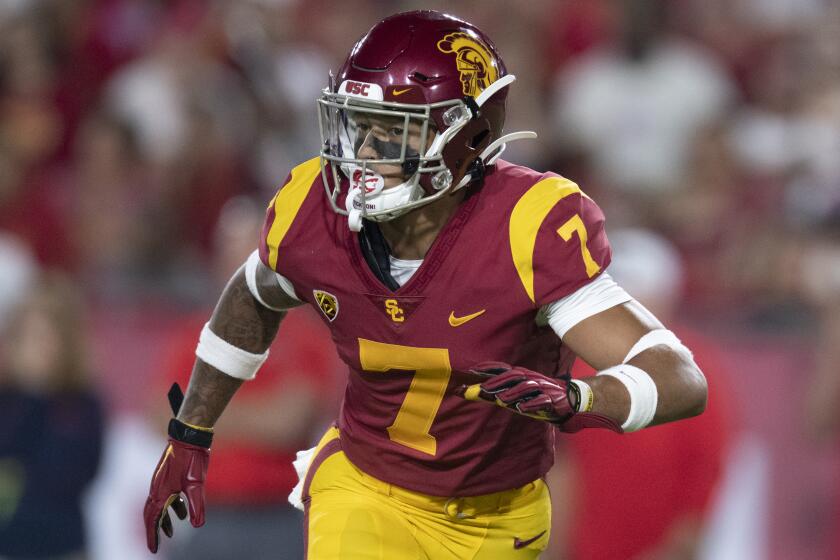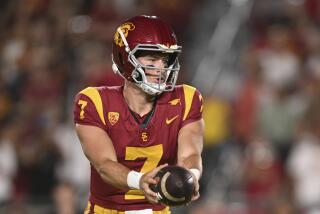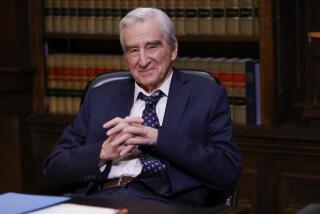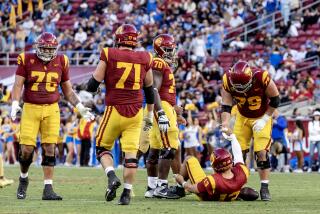Illness and a Texas detour left Bru McCoy hurting. Clay Helton helped him turn a corner
Drenched in sweat, short of breath, Bru McCoy sank into the leather of his dormitory room couch late last summer, wondering if his misery would ever end.
The last year had been the most difficult of his life. The very public transfer saga from USC to Texas and back to USC. The hailstorm of online hate in its wake. Feelings of betrayal, self-doubt, uncertainty, regret. McCoy weathered it all, hellbent on proving wrong every online stranger who’d questioned his heart or condemned his character.
He left Austin in May 2019 and returned to L.A. determined to turn the tables. Then, his body turned on him.
The exhaustion set in just days after he arrived at USC. His temperature spiked to more than 100 degrees. He began sweating nonstop, his body losing so much water that his muscles cramped constantly. Some days, he dropped as much as five pounds and required an IV. Most nights, he was forced to flip his moist mattress just to get to sleep.
A doctor diagnosed McCoy with strep throat, but the mysterious symptoms refused to abate. McCoy and his family feared the worst. Could it be cancer? An autoimmune disorder? Something else? He was poked, prodded and scanned by a parade of specialists, all of them unable to explain why his body was rebelling against itself.
“They reached a point where they were second-guessing if I was even sick,” McCoy said.
With the California Department of Health releasing COVID-19 safety guidelines for schools, UCLA and USC could be in position to start practices soon.
Even McCoy wondered if, on some existential level, he was being punished for his winding path back to USC. As if the football gods were making him pay. For months, he lay on that dorm couch wondering, replaying the decisions he made.
“He really at one point thought he was going to die,” his father, Horace, said. “He was scared.”
Still, the doubts and criticism persisted. McCoy understood why. But he didn’t want to explain his situation. Not to strangers, not to teammates, not even to family. He felt embarrassed, ashamed. So he retreated inward, playing hours of video games, papering over his worst fears, closing himself off to friends and family, coaches and teammates.
“I was in a really bad place,” McCoy said. “It felt like nothing was clicking.”
Trojans coach Clay Helton tried as often as he could to check on McCoy. He knew the previous six months had been an emotional minefield. But now, he sensed something was weighing heavily on the former five-star recruit from Santa Ana Mater Dei High. He called him in for a one-on-one meeting.
Months after his mysterious symptoms finally relented, McCoy still has no clue what made him sick. He’s not sure he’ll ever know. Even a stint in the hospital, under three days of observation, offered little in the way of answers.
But ask him when everything began to turn around, and McCoy points to that meeting with Helton as the moment he finally saw “the light at the end of the tunnel.”
::
For so long, everything seemed to come easily. That was the perception from the outside, at least. When people watched McCoy, they saw the chiseled frame, the extraordinary athleticism, the prolific, technical precision. They saw one of the most celebrated young athletes in California — a wideout capable of weaving through double teams, plowing through tacklers, and making smaller defenders look silly. They saw a sure thing.
“He was one of those guys that could honestly play anything he wanted,” Helton said.
What most couldn’t see was the pressure building below the surface. Over the years, Mater Dei coach Bruce Rollinson had noticed a tell. On the rare occasion McCoy made a mistake, he’d lock his arms and clench his fists, as if frustration were coursing through his veins.
“I found myself always telling him, ‘We’re not all perfect,’” Rollinson said.
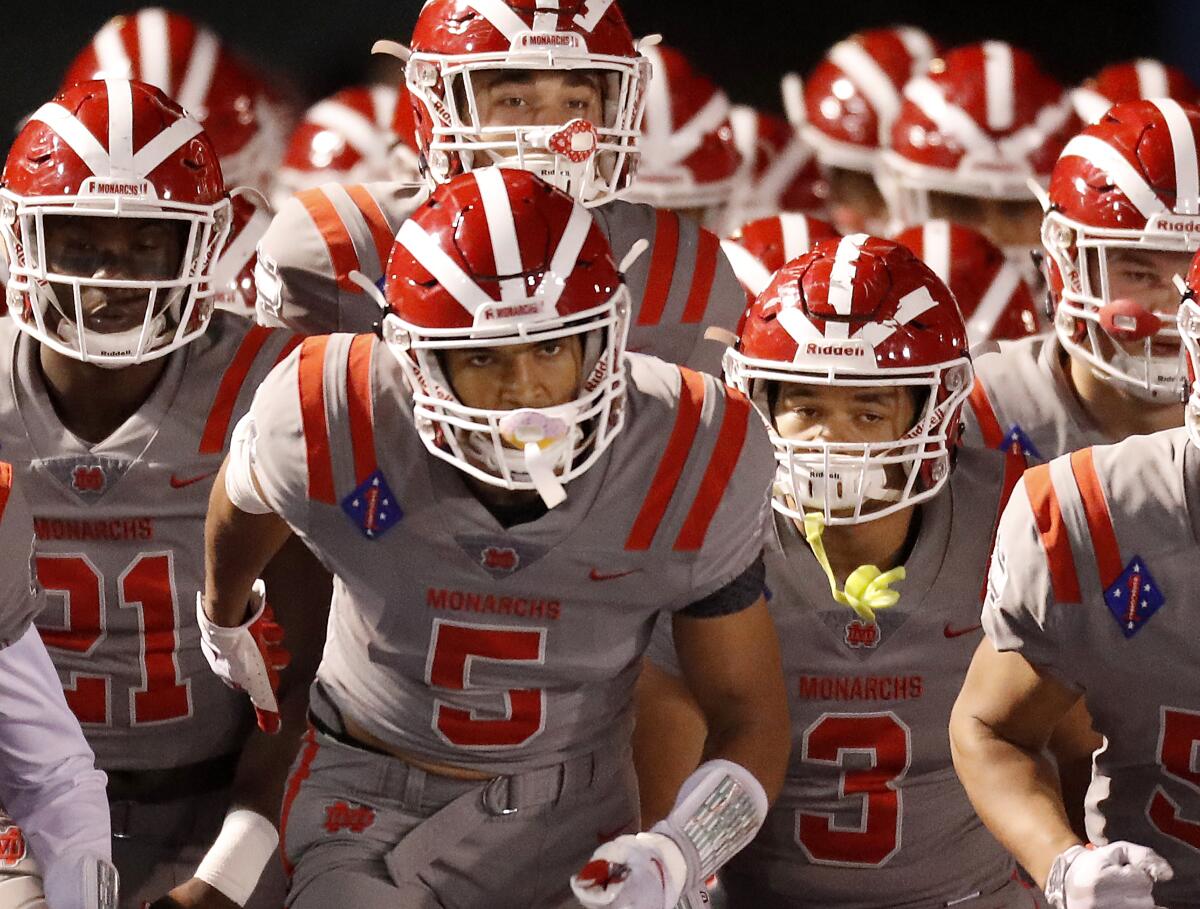
But McCoy always pushed toward perfection, anyway, piling on so much work between school and football that every night he returned home exhausted. Before leaving for USC in December 2018, his parents told him to take the spring off — to relax, to be a kid — but McCoy didn’t want to waste time. He went straight from the CIF state championship to the All-American Bowl to campus, without so much as a moment to breathe.
“Hindsight is always 20/20,” he said.
It’s an expression McCoy uses often in recalling the miserable months that followed — the sudden exit of Trojans offensive coordinator Kliff Kingsbury in January 2019, the hasty decision soon after to leave his dream school, the second-guessing at Texas, the choice to reverse course and return to USC — because it’s the only way he knows how to move forward. If he could do it all again, of course, he never would’ve left USC.
“I learned a lot,” McCoy said. “Now looking back, it’s like, you should’ve just put your head down and kept being the person you were through all of high school, and it would’ve worked out.”
But that realization took time. For months, McCoy dwelled on those regrets, letting them slosh around his mind over long days spent sick in his room. He was hurt and angry. He blamed himself for taking things too personally, for internalizing the scrutiny of strangers, for letting his failures play out so publicly.
The weight of it all felt suffocating. He’d never been forced to confront fallout of his own making — let alone, in front of thousands of critics online — and returning to USC meant steering straight into the skid. But he knew it was the only way to right his initial wrong.
The online scolding was swift and ruthless, nonetheless.
“The things he told me he was going through, getting death threats and everything … as an 18-, 19-year-old kid, that’s a lot to be put on your shoulders, you know?” said Chris Steele, a Trojans cornerback and close friend who transferred to USC around the same time as McCoy. “You’ve got grown men with children of their own [messaging] you about a decision that you’ve made. You’re 18, 19 years old. You don’t necessarily know how to deal with things like that.”
Horace McCoy tried to be a realist. He laid out the hurdles he knew Bru would face. Just keep your head down, he told him.
“One day all of this will make sense,” Horace said. “You’ll be able to look over your shoulder in a few years from now, and know this made you a better person today.”
When Helton asked to meet, McCoy still was struggling to see that bigger picture.
USC defensive back Chase Williams says he’s willing to boycott the season if safety measures aren’t strengthened. But he’s hoping it doesn’t come to that.
The coach had tried to ease the anxiety of McCoy’s return as best he could. He called a team meeting to openly broach the subject. He offered resounding support of McCoy’s decision.
But now, Helton was worried about him. He knew McCoy better than most incoming freshmen. Their families lived less than two miles apart in Rancho Palos Verdes, and they’d grown close over the years.
As they sat down, one on one, Helton was direct. “What’s going on?” he asked McCoy, who was drenched in sweat. “Are you doing OK?”
Helton suggested that McCoy take a step back from football. For his entire life, football had defined him. Now was the time to sort out his life without it.
Coach and player talked for more than an hour. McCoy opened up. Football was only a footnote.
“More than anything, he just told me, life is going to go on,” McCoy said. “I was still going to get to live out the dream I wanted to live out. Everything I look back on now, I think he was so right. That conversation really changed things for me.
“I was really shut off from everybody, and he said everything that was floating in the room but no one wanted to say. He kind of broke that barrier down.”
There still were plenty of obstacles to overcome. But now, McCoy was determined to face them. He set goals — modest ones at first. Go to all of his classes. Drink as much water as he could. Some days, he’d try to run on the treadmill. Others, he swam in the pool. Good days started stacking onto good days.
Bit by bit, McCoy finally began to feel better.
::
The cruel irony of his current situation, on the eve of a scheduled start of an uncertain college football season, isn’t lost on McCoy.
“I get healthy, and now the world gets sick with a respiratory illness?” he said. “That chain of events, it doesn’t even sound real.”
McCoy didn’t mind months of quarantine. He describes himself as “a homebody,” happy to spend his days training and playing video games. Most days during the lockdown, he rode his bike through the hills of Palos Verdes, just happy to have his health back.
“It all came into perspective for me while I was sick,” McCoy said. “I had a lot of free time to look back on everything, to put all this other stuff to the side for a second. I’m still a person.”
He has a much better grasp on that now. He’s not so hard on himself anymore. Eighteen months after he first entered the NCAA transfer portal, McCoy, who will be a redshirt freshman, is at peace with the path that brought him here.
The path that lies ahead still is uncertain. With COVID-19 threatening college football, there’s no guarantee that McCoy will get to play this year either.
“No one has those answers,” he said. But the weight of that uncertainty no longer feels so heavy.
“Everything,” McCoy said, “will eventually find its way.”
More to Read
Go beyond the scoreboard
Get the latest on L.A.'s teams in the daily Sports Report newsletter.
You may occasionally receive promotional content from the Los Angeles Times.

